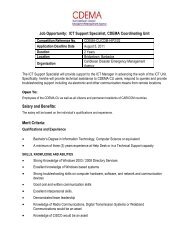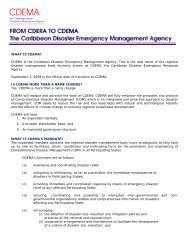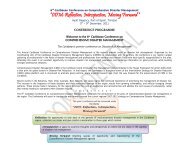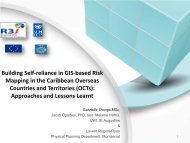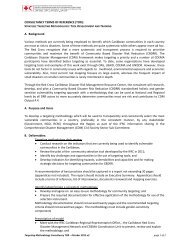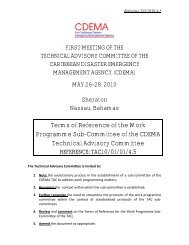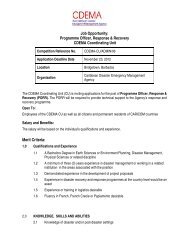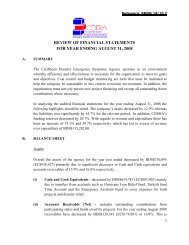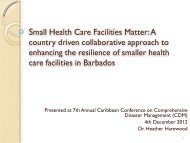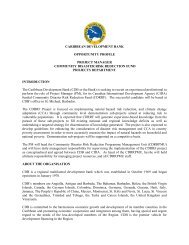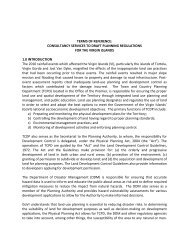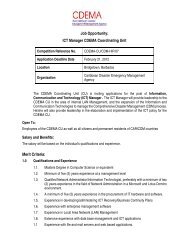You also want an ePaper? Increase the reach of your titles
YUMPU automatically turns print PDFs into web optimized ePapers that Google loves.
Appendix 4: Annotated Outline of the Model Community-Based Climate Change<br />
and Disaster Risk Reduction (MCCCDRR) Programme<br />
GLOSSARY OF TERMS<br />
To be completed in final version: the definition of these terms will be taken from the<br />
Comprehensive Disaster Management (CDM) Strategy and Programme Framework 2007-<br />
2012; and the Intergovernmental Panel on Climate Change (IPCC) glossary of climate change<br />
terms i .<br />
LIST OF ACRONYMS<br />
To be completed in final version<br />
1. BACKGROUND AND CONTEXT<br />
There is a general consensus that climate change is already happening and that its impacts will<br />
likely get worse before they get better. The nations of CARICOM 7 contribute less than 1% to<br />
global greenhouse gas (GHG) emissions (approx. 0.33% 8 ) (World Resource Institute, 2008),<br />
yet these countries are expected to be among the earliest and most severely impacted by<br />
climate change in the coming decades, and are least able to adapt to climate change impacts<br />
(Nurse et al., 2009).<br />
Climate change and disaster risk reduction are inextricably linked and the region has decades of<br />
experience with climate-related disasters that have resulted in loss of lives and livelihoods. It<br />
follows, therefore, that if preventative measures are taken to avoid disasters, resilience to a<br />
climate-related event is enhanced and a first line of defence against climate change is<br />
established. A practical application of this would be to use knowledge and expertise about<br />
building resilience to existing climate variability as a starting point for developing adaptation<br />
policies, taking into account that climate change will exacerbate existing climate hazards.<br />
It is important to mention that climate hazards do not always cause disasters. It is the<br />
combination of a hazard event with an exposed, vulnerable and ill-prepared system (country,<br />
institution, community, household, or ecosystem) that results in a disaster. This combination is<br />
even more likely to happen since climate change will increase the frequency and/or severity of<br />
weather and climate hazards (IPCC Fourth Assessment <strong>Report</strong>), and climate change will<br />
simultaneously increase communities’ vulnerability to natural hazards due to the combined<br />
effects of ecosystem degradation, reduced availability of water for ecosystems and agriculture,<br />
and changes in peoples’ livelihoods (UNISDR).<br />
Communities are often vulnerable because they have few livelihood assets that would improve<br />
their adaptive capacity to hazards. And of all the factors that make communities vulnerable,<br />
poverty is the most significant. Participatory approaches to community disaster risk reduction<br />
that empower communities to protect their own livelihoods are therefore now widely used.<br />
7 Members of CARICOM: Antigua and Barbuda, The Bahamas, Barbados, Belize, Dominica, Grenada, Guyana, Haiti,<br />
Jamaica, Montserrat, Saint Lucia, St. Kitts and Nevis, St. Vincent and the Grenadines, Suriname, Trinidad and<br />
Tobago. <strong>CDEMA</strong>’s participating states include all CARICOM states as well as Anguilla, British Virgin Islands, Turks<br />
and Caicos Islands.<br />
8 The Caribbean Islands contribute about 6% of the total emissions from the Latin America and Caribbean Region<br />
grouping and the Latin America and Caribbean Region is estimated to generate 5.5% of global CO 2 emissions in<br />
2001 (UNEP 2003).<br />
48



